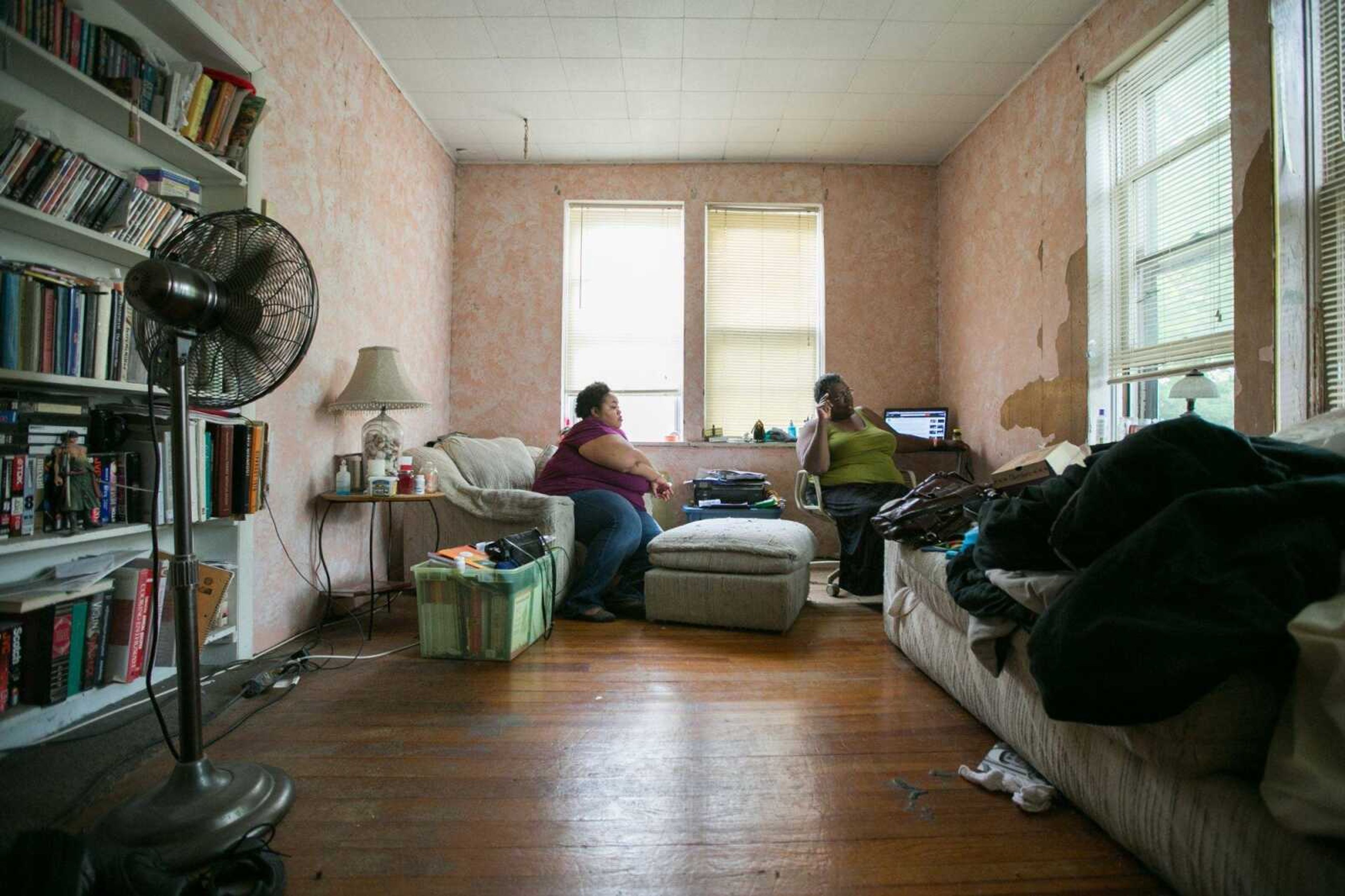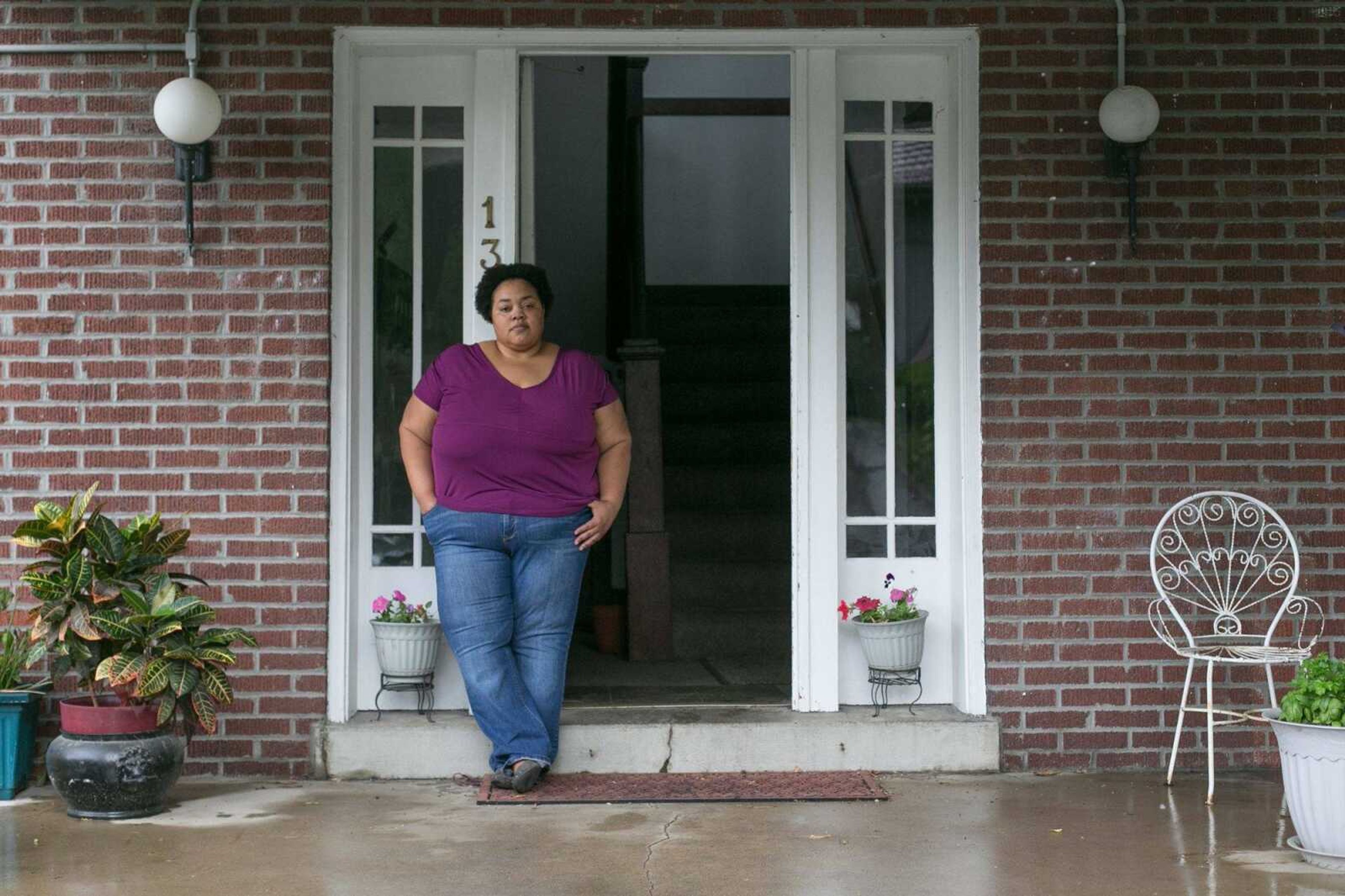Medicaid missteps gave reluctant state lawmakers a line of attack
JEFFERSON CITY, Mo. -- Two years ago, Echo Garrett lost her job at a call center. The 35-year-old Cape Girardeau woman was left to scramble without income and the health insurance she had counted on. She was hired at a fast-food chain in August, but the job has no health benefits, and she doesn't earn enough to purchase private health insurance...
JEFFERSON CITY, Mo. -- Two years ago, Echo Garrett lost her job at a call center. The 35-year-old Cape Girardeau woman was left to scramble without income and the health insurance she had counted on.
She was hired at a fast-food chain in August, but the job has no health benefits, and she doesn't earn enough to purchase private health insurance.
Garrett also can't qualify for Medicaid, the government-funded health-care program for the poor, because she has no children.
Nearly 180,000 Missourians are in a similar predicament -- they can't afford private health insurance but they either make too much money or don't have children, making them ineligible to join the state's Medicaid rolls.
States have the option to alleviate this problem at a cost mostly borne by the federal government. But Missouri's Republican-led Legislature so far has refused to use the federal dollars to expand Medicaid's eligibility to cover Garrett and those like her.

For advocates pressuring the Legislature, Garrett's story fits the bill as a compelling case. She can't qualify for the current program no matter how little she makes, because Missouri doesn't cover adults without children. She has a job. And she has health needs -- asthma and osteoarthritis -- that require medical care.
But lawmakers have been resistant. They've cited fiscal concerns because the state eventually would need to pay 10 percent of the expansion's cost. But they've also complained about the operation of the current program, saying it's mismanaged and wastes money.
It turns out they may have hit the mark.
At the same time Garrett was losing her job and trying to get health insurance, a team of federal auditors was leading an investigation into Missouri's Medicaid program.
The auditors would accuse Missouri of failing to collect required prescription drug rebates from manufacturers and improperly billing the federal government at least $34 million. Those conclusions were only unveiled last month. But to critics of Medicaid expansion, it was only the most recent drop in the bucket.
"There doesn't seem to be any progress or remedial action taken on fixing the program we have in service," House Speaker John Diehl, R-Town and Country, said after the audit was released. "Why would we add more [eligible people] if we can't take care of the current ones?"
The audit was only the latest in a series of management missteps to come to light as lawmakers were considering Medicaid expansion. For example:
- The Post-Dispatch reported in February 2014 that pregnant women had wait times as long as 90 days before their Medicaid applications were approved.
- Federal officials demanded in June 2014 that Missouri answer how it would solve a backlog of thousands of other Medicaid applications stemming from the implementation of President Barack Obama's health law.
- Missouri consumers faced wait times averaging 17 minutes in August 2014 when trying to reach a Jefferson City call center with questions about the program. Those times exceeded the amount allowed in Missouri's contract with the call center vendor.
- The federal government recommended in October 2014 that Missouri refund $11 million for claiming improper Medicaid reimbursement for treatment of individuals with developmental disabilities.
- A state audit released in March found Medicaid failed to claw back $27 million in claims made by dead people.
- And in April, a federal audit recommended the state refund more than $34 million to the federal government for failing to bill drug manufacturers for rebates.
These issues, combined with the politics of Medicaid and health care, have contributed to the Legislature's reluctance to expand the program.
But for Garrett and those like her, the reasons are inconsequential.
"I feel like I'm flailing in the ocean," she said.
Getting off the ground
Medicaid was signed into law nearly 50 years ago. It is run jointly by the federal government and the states, which share responsibility for the program's cost. The federal government lays out certain rules and procedures, but states have some flexibility when it comes to administering the program.
Missouri's Medicaid program covers about 850,000 children, pregnant women, low-income parents, people with disabilities and the elderly.
It's an expensive program -- the single largest expenditure in Missouri, eating up more than one-third of the state's operating budget. The program in Missouri has grown 50 percent since fiscal year 2005, and total spending is about $8.5 billion a year.
A key provision of the federal health care overhaul required states to expand Medicaid eligibility to cover residents with incomes above 133 percent of the federal poverty line, or $27,000 for a family of three. That would have provided coverage to an additional 300,000 Missourians, including Garrett and the other 180,000 people who fall into a coverage gap.
But, in upholding the law in a 2012 case, the U.S. Supreme Court said states could not be required to expand their programs. The ruling set off a state-by-state debate on whether to use mostly federal dollars to add more recipients to Medicaid.
Despite Gov. Jay Nixon's enthusiastic endorsement of Medicaid expansion after his re-election in 2012, fiscal conservatives and Republican critics of Obamacare were opposed.
Not only were they concerned about cost, they also seized on another line of attack against expansion -- the current program was so mismanaged that more people couldn't be added until the problems were fixed.
"We've seen the poor outcomes, the inefficiencies and the lost revenues from poor administration," said Rep. Sue Allen, R-Town and Country. "You can't ignore it and it has been part of the expansion debate."
A long wait
One of the most damaging instances cited by lawmakers was the backlog of Medicaid applications stemming from the launch of HealthCare.gov.
Obama's health law requires Americans to have health insurance or face a penalty. Those who can't get coverage from their employers can apply for insurance -- and government subsidies -- through government-run online exchanges. In states that chose not to set up their own exchanges, such as Missouri, residents apply through HealthCare.gov.
Because some of those applying for coverage would qualify for Medicaid, HealthCare.gov applications were sent to individual states.
Starting in January 2014, Missouri was inundated with applications and had trouble keeping up.
The average wait time for residents to have their applications reviewed doubled from 21 days in July 2013 to 42 days in January 2014. Average application wait time hit a peak of 79 days in September and November 2014.
State officials were hindered by a new computer system for processing the applications and a departmental reorganization that occurred simultaneously. As the applications piled up, Nixon tapped his longtime aide, Doug Nelson, to sort out the mess.
Nelson, who serves as Missouri's Commissioner of Administration, blamed the Legislature for part of the fallout. He said lawmakers delayed funding for the new computer system for more than a year, putting the department behind.
The Nixon administration requested $50 million for the system in 2012, but lawmakers refused, citing concerns the money would be used to create a state-based health exchange. The Legislature ended up approving money the following year only after voters approved a ballot measure that prevented the governor from creating a Missouri exchange.
Nelson said the delayed spending authority led to problems with processing applications.
"We were forced to build the airplane at the same time we had to fly it," he said.
Moving forward
The Nixon administration has stressed that things are improving when it comes to the applications.
The average application wait time dipped down to 42 days in March, state data show, cut nearly in half from its peak. But that's double the wait time from before the federal health law launched.
In a written statement, Nixon acknowledged some management issues in the Medicaid program. But he said problems were being solved and pointed to the reduction in application wait times.
"Members of the Legislature are using an issue from last year as an excuse for doing the wrong thing today," Nixon said in the statement.
Supporters of Medicaid expansion have lauded the progress. But they disagreed it should have been an issue when it came to the Medicaid expansion debate.
"Measures are being taken to improve that system and it shouldn't be a reason that we don't provide coverage to those who need it," said Michelle Trupiano, executive director of the Missouri Medicaid Coalition. The group represents hospitals, other medical providers and advocates who support the program's expansion.
Others are less forgiving.
"There's an attitude that the easiest way [to solve these problems] is to come back and get more money from the taxpayers," Diehl, the House speaker, said.
Regardless of how the progress is viewed, Medicaid expansion could be a ways off for Missouri.
The debate didn't get far this year. Measures to approve the expansion overwhelmingly failed in both chambers. In an effort to get the ball rolling again, Nixon embraced a controversial proposal that would require recipients to work or enroll in job training to receive the health benefits. His announcement did little to sway Republicans.
This report was prepared in collaboration with Kaiser Health News, an editorially independent program of the Kaiser Family Foundation.
Connect with the Southeast Missourian Newsroom:
For corrections to this story or other insights for the editor, click here. To submit a letter to the editor, click here. To learn about the Southeast Missourian’s AI Policy, click here.









